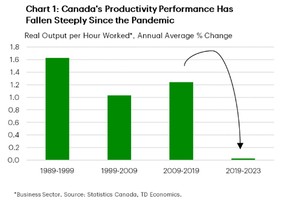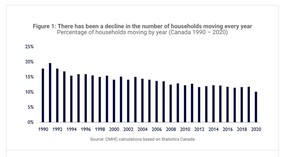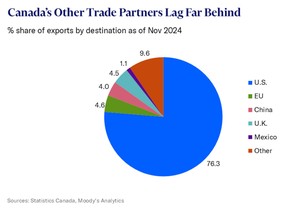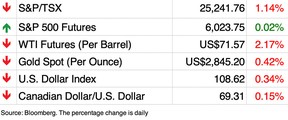Affordability crisis is limiting population mobility in this country, warn CMHC
Article content

Article content
Article content
Canadians are taking a breath this morning after a rollercoaster of a day that ended with a month’s reprieve from U.S. President Donald Trump’s crippling tariffs.
The prospect of a trade shock remains, however, and the fear that has been building since Trump took office has dragged some of our own problems into the spotlight: Canada’s lagging productivity and the difficulties of interprovincial trade.
Advertisement 2
Article content
Productivity in this country has nose-dived since the pandemic, making it one of the worst performing advanced economies. So much so that last year the Bank of Canada declared a productivity “emergency.”

Barriers to trade between provinces have also held us back. Studies have found that in many cases foreign companies are getting better access to Canada’s market than Canadian companies themselves.
But there is another barrier that is sapping productivity, according to the Canada Mortgage and Housing Corporation — high home prices.
Canada’s affordability crisis is limiting population mobility in this country, which has been declining for decades, says the CMHC. This in turn hampers productivity by preventing employees from taking better jobs and employers from attracting the talent they need.
Their study estimates that every one per cent increase in home prices in a city can lead to a one per cent decline in the number of people moving there.

Take Toronto for example. CHMC calculates that if Canada’s largest city were to double its housing starts over the next decade to address affordability challenges the population would be 3 per cent greater than what is currently projected.
Article content
Advertisement 3
Article content
Why is this important?
When a large number of businesses and people locate in one area it’s known as an agglomeration economy. Productivity increases from the ability to share resources, match supply and demand and exchange ideas. A world-famous example is Silicon Valley, the hub of U.S. technology.
“Our major cities are the focus of excellence in innovation from high-tech software to life sciences and financial services. As such, they are an engine of productivity growth,” said Aled ab Iorwerth, the CMHC’s deputy chief economist.
Canada is missing out on developing the full potential of these productivity engines by not addressing high housing costs, he said. Canadians who wish to move to these hubs for a better job that improves their skills and knowledge and the productivity of the country are more likely to turn down the opportunity if they can’t afford to live there.
“The impacts of these decisions on where to live and work play out on a wider scale. Their broader effect is to curtail upskilling that in turn undermines growth in one of the key drivers of productivity growth, the skills and knowledge of Canadians,” said ab Iorwerth.
Advertisement 4
Article content
Sign up here to get Posthaste delivered straight to your inbox.


If Canada wants to diversify its trade away from the United States, it’s got some work to do. Today’s chart from Moody’s Analytics shows the country’s high dependency on its southern neighbour with 76.3 per cent of Canadian exports crossing the border to the U.S. in November. A much smaller share goes to its other primary export destinations with the European Union, China and United Kingdom all getting less than 5 per cent of exports.
“By increasing its reliance on other trading partners, Canada could become less vulnerable to shocks generated by U.S. protectionist trade policies,” said Moody’s economist Kyra Kendrick.

- Today’s Data: United States factory orders, durable goods orders
- Earnings: Alphabet Inc., PepsiCo Inc., Pfizer Inc., Finning International Inc., Merck & Co. Inc




Investors can find unpredictable turns in stock markets hard to handle but their resolve will especially be tested this year due to U.S. President Donald Trump’s actions. Economists expect market volatility surges driven by a combination of policy changes, trade disruptions and economic and currency shocks from his administration. Julie Cazzin explains how investors can protect their portfolios and prosper in uncertain times. Find out more
Advertisement 5
Article content
Calling Canadian families with younger kids or teens: Whether it’s budgeting, spending, investing, paying off debt, or just paying the bills, does your family have any financial resolutions for the coming year? Let us know at wealth@postmedia.com.
McLister on mortgages
Want to learn more about mortgages? Mortgage strategist Robert McLister’s Financial Post column can help navigate the complex sector, from the latest trends to financing opportunities you won’t want to miss. Plus check his mortgage rate page for Canada’s lowest national mortgage rates, updated daily.
Financial Post on YouTube
Visit the Financial Post’s YouTube channel for interviews with Canada’s leading experts in business, economics, housing, the energy sector and more.
Today’s Posthaste was written by Pamela Heaven, with additional reporting from Financial Post staff, The Canadian Press and Bloomberg.
Have a story idea, pitch, embargoed report, or a suggestion for this newsletter? Email us at posthaste@postmedia.com.
Recommended from Editorial
-

Young Canadians are losing homeownership hope
-

What Canada’s ‘age pyramid’ means for the economy
Bookmark our website and support our journalism: Don’t miss the business news you need to know — add financialpost.com to your bookmarks and sign up for our newsletters here
Article content
High home prices are sapping Canada’s productivity, warns CMHC
2025-02-04 12:56:41






